|
|
|
Sort Order |
|
|
|
Items / Page
|
|
|
|
|
|
|
| Srl | Item |
| 1 |
ID:
157714
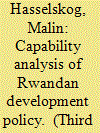

|
|
|
|
|
| Summary/Abstract |
This article provides a capability analysis of Rwandan development policy. It is motivated by impressive progress on human development indicators in combination with highly centralised policymaking, giving ambiguous signs regarding a capability approach. It is based on extensive original empirical material, along with large numbers of official documents and academic sources. The analysis is structured around three issues that concern the relation between individual agency and government policy, and that are debated among capability scholars as well as in relation to Rwandan development policy: participation, transformation and paternalism. The finding that Rwandan development policy reflects an approach very different from a capability approach is not surprising, but establishes that the assumed link between human development indicators and the capability approach needs to be questioned. This brings our attention to shortcomings in any quantitative measurements of development, or in the use of and importance attached to them, as well as to the problem of assuming that certain outputs go hand in hand with certain processes. While this is valid for contexts far beyond Rwanda, it also sheds light specifically on the polarisation that exists in the scholarly debate on Rwanda
|
|
|
|
|
|
|
|
|
|
|
|
|
|
|
|
| 2 |
ID:
157708


|
|
|
|
|
| Summary/Abstract |
Developing countries have suffered most of the financial crises in the context of the process of economic and financial globalisation. Both current and previous crises have revealed that unpredictability is a feature common to all the episodes which occurred during the process of globalisation. Although certain alarms went off, any of those external financial crises were actually predicted by the advanced methods in use for prediction and country risk analysis. Taking into consideration the information above, the aim of this paper is to check the ability to foresee external financial crises in developing countries of both the country risk index published by Euromoney and the Credit Ratings variable included therein. We have focused on the external financial crises that took place between 1992 and 2011, that is, in a full globalisation era. The results are negative. It appears that neither the index nor the sovereign ratings are able to reflect early enough the vulnerabilities that arise previously to the setting off the crisis episodes. This leads us to conclude that the existing models of country risk have limits. Thus, it would necessary to develop new instruments to measure this risk, considering uncertainty as an essential feature of the current economic and financial environment.
|
|
|
|
|
|
|
|
|
|
|
|
|
|
|
|
| 3 |
ID:
157712
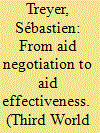

|
|
|
|
|
| Summary/Abstract |
This paper looks at aid ownership through the lens of negotiations that take place between a country and its development partners (DPs). Based on the case of Ethiopian food security policies, it combines a structural analysis of the negotiation capital of both parties with an actor-oriented analysis of the institutional setting through which negotiations take place. First, it shows that the growing influence donors have come to have in the shaping of Ethiopian public policies results from the relative loss of legitimacy the government has experienced after the 2005 political crisis and its greater need for external economic assistance. Second, the more recent creation of a negotiation platform between the Government of Ethiopia (GoE) and its DPs has allowed the GoE to enhance donor’s alignment with its development policies and regain some control over its development agenda, while giving them more room to contribute to several food and nutrition security policy reforms which have been positively evaluated. The paper stresses the need for donors to better recognise the centrality of politics in any aid intervention.
|
|
|
|
|
|
|
|
|
|
|
|
|
|
|
|
| 4 |
ID:
157711


|
|
|
|
|
| Summary/Abstract |
This paper looks at aid ownership through the lens of negotiations that take place between a country and its development partners (DPs). Based on the case of Ethiopian food security policies, it combines a structural analysis of the negotiation capital of both parties with an actor-oriented analysis of the institutional setting through which negotiations take place. First, it shows that the growing influence donors have come to have in the shaping of Ethiopian public policies results from the relative loss of legitimacy the government has experienced after the 2005 political crisis and its greater need for external economic assistance. Second, the more recent creation of a negotiation platform between the Government of Ethiopia (GoE) and its DPs has allowed the GoE to enhance donor’s alignment with its development policies and regain some control over its development agenda, while giving them more room to contribute to several food and nutrition security policy reforms which have been positively evaluated. The paper stresses the need for donors to better recognise the centrality of politics in any aid intervention.
|
|
|
|
|
|
|
|
|
|
|
|
|
|
|
|
| 5 |
ID:
157717


|
|
|
|
|
| Summary/Abstract |
There is wide engagement with large-scale land deals in sub-Saharan Africa, particularly from the perspectives of development and international political economy. Recently, scholars have increasingly pointed to a gendered lacuna in this literature. Engagement with gender tends to focus on potential differential impacts for men and women, and it also flags the need for more detailed empirical research of specific land deals. This paper draws from ethnographic data collected in Northern Sierra Leone to support the claim that the impacts of land deals are highly gendered, but it also argues that lineage in a land-owning family and patronage intersect with these gendered impacts. This data supports my claim that analysis of land deals should start from an understanding of the context-dependent, complex arrays of power and marginality. Such a starting point allows for a wider and ‘messier’ range of impacts and experiences to emerge.
|
|
|
|
|
|
|
|
|
|
|
|
|
|
|
|
| 6 |
ID:
157710


|
|
|
|
|
| Summary/Abstract |
Foreign aid donors are increasingly focused on changing the way their development agencies function. This discourse has focused on desired qualities, including greater knowledge of local contextual realities, appropriate adaptation to context and greater flexibility to respond to changing circumstances. We argue that more attention needs to be devoted to the achievement of these qualities and turn to contingency theory to identify some under-exploited ways to ‘do development differently’. The qualities sought by donors are emergent properties of complex organisational systems and will only be achieved through a micro-level and interlinked focus on the fundamentals of organisation.
|
|
|
|
|
|
|
|
|
|
|
|
|
|
|
|
| 7 |
ID:
157715
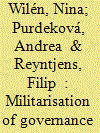

|
|
|
|
|
| Summary/Abstract |
In this article, we develop and expand the rebel-to-ruler literature to go beyond ‘rebel transformations’, in order to examine the transformation and militarisation of the entire post-genocide society in Rwanda. Through a historical and socio-political analysis of the military’s influence in post-genocide Rwanda, we argue that the adoption of military norms and ethos, drawn from an idealised and reconstructed pre-colonial history rather than simply an insurgent past, motivates the military’s centrality and penetration of all society’s sectors, economically, politically and socially, with the ultimate aim of retaining power in the hands of the rebels turned rulers. As such, the case demonstrates the need for an expansion of the rebel-to-ruler literature (1) beyond its concern with parties and regime type to a broader palette of governance effects and (2) beyond its singular focus on insurgent past and towards a longue-durée understanding of complementary causes
|
|
|
|
|
|
|
|
|
|
|
|
|
|
|
|
| 8 |
ID:
157709
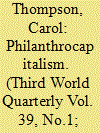

|
|
|
|
|
| Summary/Abstract |
Engaging the lively debates about the next expression of neoliberalism, this study suggests that it is evolving into philanthrocapitalism. After a brief discussion of the trajectories from neoliberalism, the article addresses the core ideology of philanthrocapitalism. The central thesis explores how philanthrocapitalism is moving beyond the requirement of ‘business practices’ for recipients of donor funds, into enforcing ‘business rule’ on to the public domain. Although philanthrocapitalism is most debated in the fields of health care and education, this article uses empirical analysis of international agricultural policies trying to enlist Southern Africa policies. It explores how philanthrocapitalist rule is reducing transparency, participation and deliberation within the public domain, well beyond requesting efficient business practices for greater food security. It concludes with how smallholder farmers are actively organising to resist business rule over their genetic resources and farming practices.
|
|
|
|
|
|
|
|
|
|
|
|
|
|
|
|
| 9 |
ID:
157713
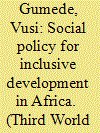

|
|
|
|
|
| Summary/Abstract |
The paper revisits the discourse on development in Africa, following in the footsteps of leading development thinkers and focusing on social policy. Some of the thinkers and scholars have specifically and directly discussed development discourse in Africa. Others have made insightful points regarding inclusive development in Africa even though not directly engaging with development discourse. The paper also acknowledges earlier thinking regarding development in Africa, including perspectives that deal with underdevelopment. The paper concerns itself with the critical role that social policy can play in ensuring inclusive development in Africa. The interface between economic and social policy is emphasised. Although Africa faces many intractable challenges, most of which are externally imposed, robust social policies will go a long way in bringing about effective social and economic development. In the main, though, Africa needs a comprehensive socio-economic development approach that can ensure lasting inclusive development. Social policies are critical for any development endeavour in African countries. Another main point that the paper makes is that economic transformation is not enough to fully advance wellbeing in Africa (and probably the world at large). By restructuring economies in Africa, not much would be achieved though some gains would be made.
|
|
|
|
|
|
|
|
|
|
|
|
|
|
|
|
| 10 |
ID:
157716


|
|
|
|
|
| Summary/Abstract |
The paper delineates three debates, which will be conflated. One line of discussion relates to public goods at a transnational level. Here, the referencing of debates regarding the characteristics of ‘a common good’ will be of significance. A second strand addresses the group of countries known as the ‘rising powers’ and the role these countries could play towards a globalised common good. A third discussion thread analyses South Africa as a case study for the main rising power on the African continent. By creating connections between the lines of discussion, this paper drives forward the debates on how the role of rising powers can be conceptually repositioned in the light of a changing global context, and explores how these countries can respond to global challenges.
|
|
|
|
|
|
|
|
|
|
|
|
|
|
|
|
| 11 |
ID:
157707
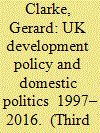

|
|
|
|
|
| Summary/Abstract |
Debate surrounds the relative importance of development aid and development policy in donor efforts to support international development. Likewise, the literature on UK development policy points to its putative stability and consistency over time. Both perspectives, however, underplay the political contention which characterises UK development policy and its variable effects. This article, therefore, examines UK development policy between 1997 and 2016 and the varying extent to which it gave rise to contentious politics over time. It explores three politically-significant periods in the context of UK development policy between 1997 and 2016: the first between 1997 and 2003, characterised, I argue, by political consensus and managed contention; a second between 2003 and 2010, characterised by transition and emerging political contention; and a third, between 2010 and 2016, characterised by contentious politics and political fracturing. I associate the first period with effective political vision and direction and the third with a significant erosion of both, to the detriment of UK development policy and its efficacy. In conclusion, I argue that UK development policy has been most effective when it has been underpinned by a clear and consensual political vision.
|
|
|
|
|
|
|
|
|
|
|
|
|
|
|
|
| 12 |
ID:
157706


|
|
|
|
|
| Summary/Abstract |
While the Syrian refugee crisis unravels at the EU’s doorstep and as the death toll in the Mediterranean continues unabated, questions about the international community’s duty to act on behalf of the afflicted people inevitably arise, thereby fuelling convoluted debates about Responsibility to Protect (R2P). In light of the international community’s inertia and of the EU’s incapacity to adequately manage the worst humanitarian crisis of recent times, this article argues that time is ripe to explore other ways to implement R2P. There is a ‘missing’ link between R2P and refugee protection and the duty to protect refugees can be framed within the R2P discourse. Building on the idea that asylum is central to the implementation of R2P, we suggest that the acknowledgment of the linkage between R2P and refugee protection is helpful not only to improve the EU management of the current crisis, but also to uphold R2P when the international community is at a stalemate.
|
|
|
|
|
|
|
|
|
|
|
|
|
|
|
|
|
|
|
|
|